(新课标)Unit 2 I think that mooncakes are delicious.SectionA(Grammar -4c)课件(共44张PPT)
文档属性
| 名称 | (新课标)Unit 2 I think that mooncakes are delicious.SectionA(Grammar -4c)课件(共44张PPT) | 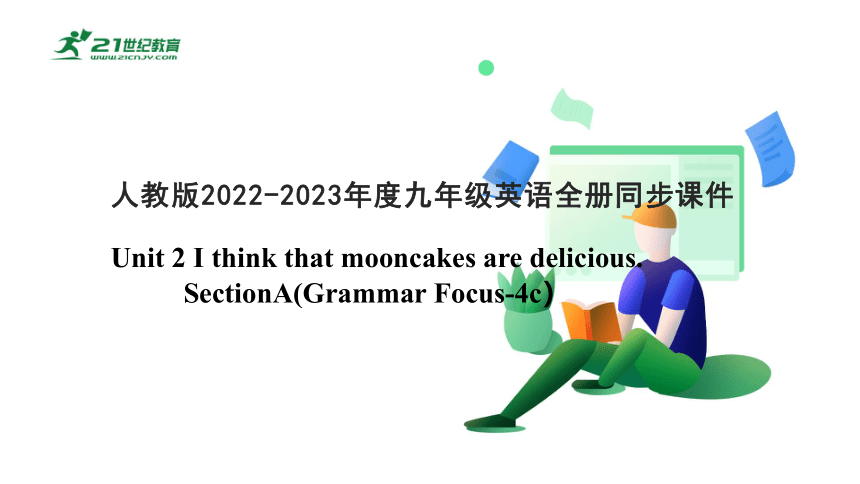 | |
| 格式 | zip | ||
| 文件大小 | 1.8MB | ||
| 资源类型 | 试卷 | ||
| 版本资源 | 人教新目标(Go for it)版 | ||
| 科目 | 英语 | ||
| 更新时间 | 2022-08-30 14:54:36 | ||
图片预览

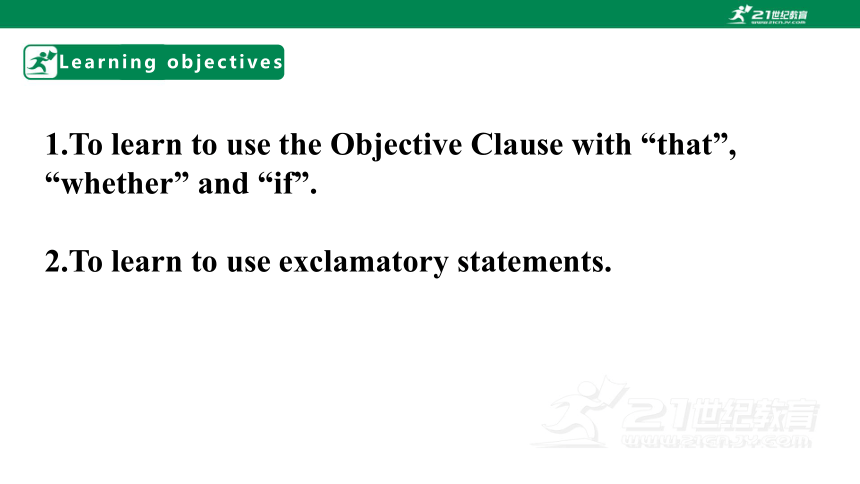
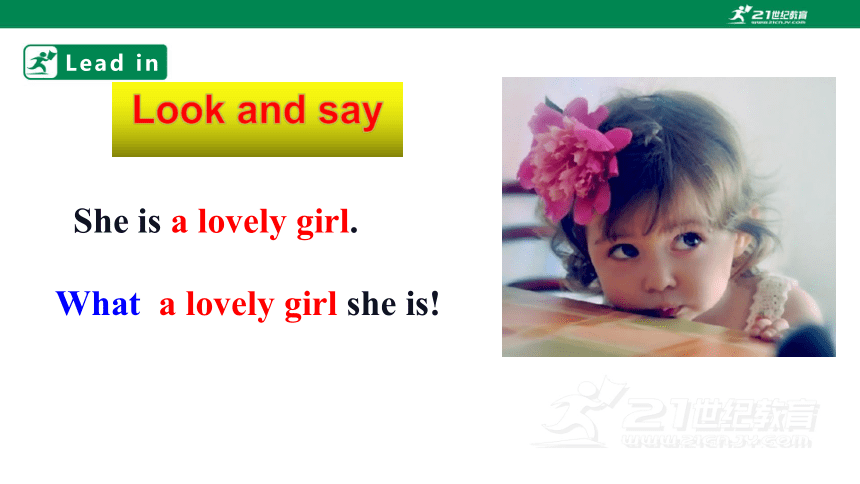
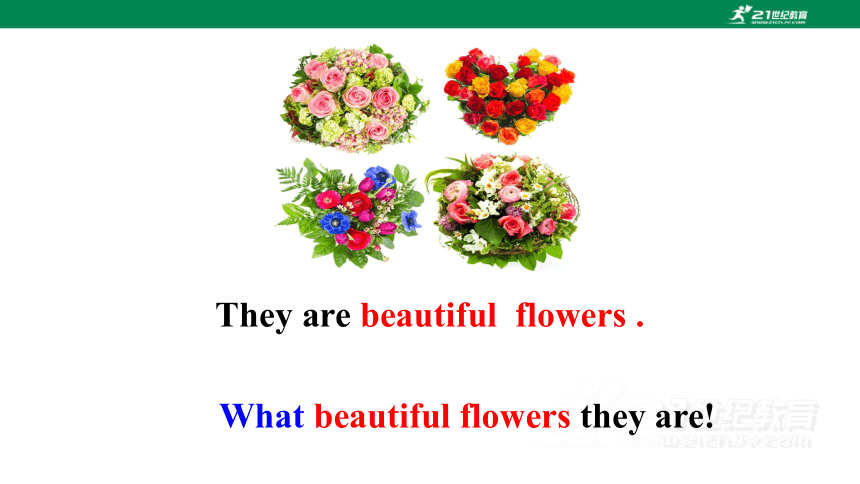
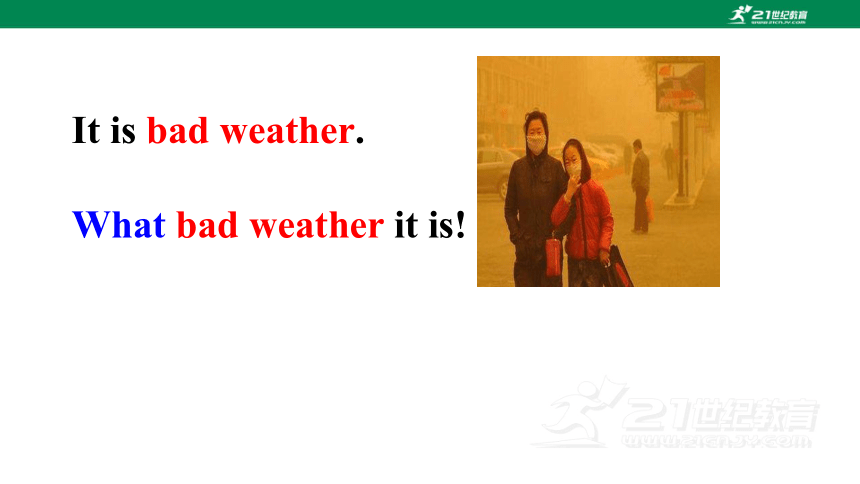
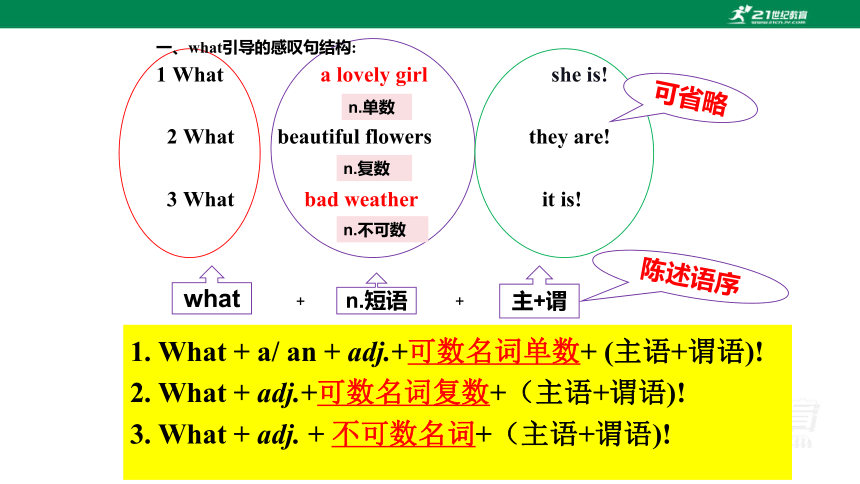
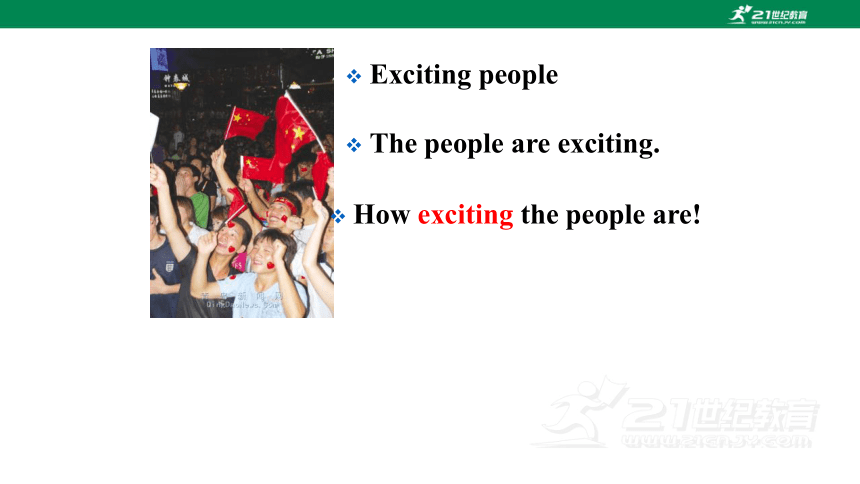
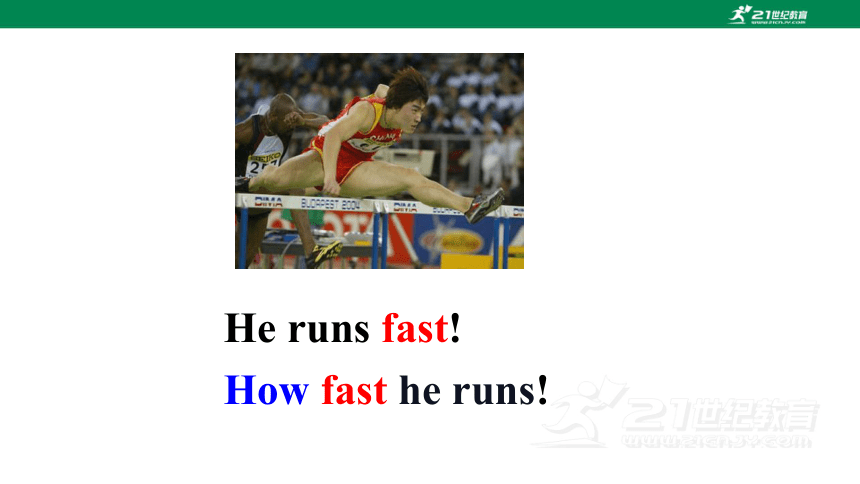
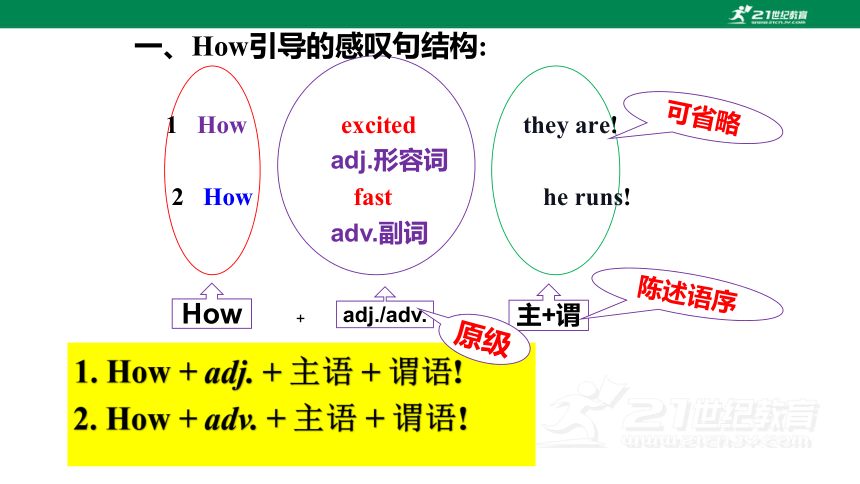
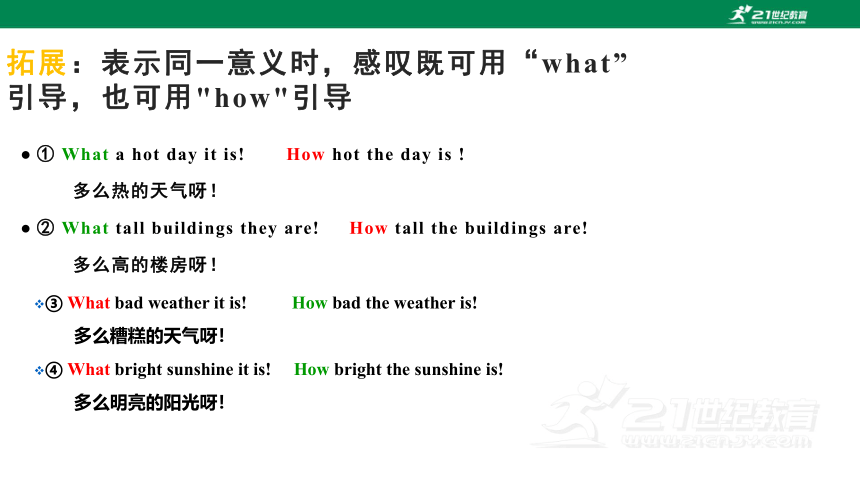
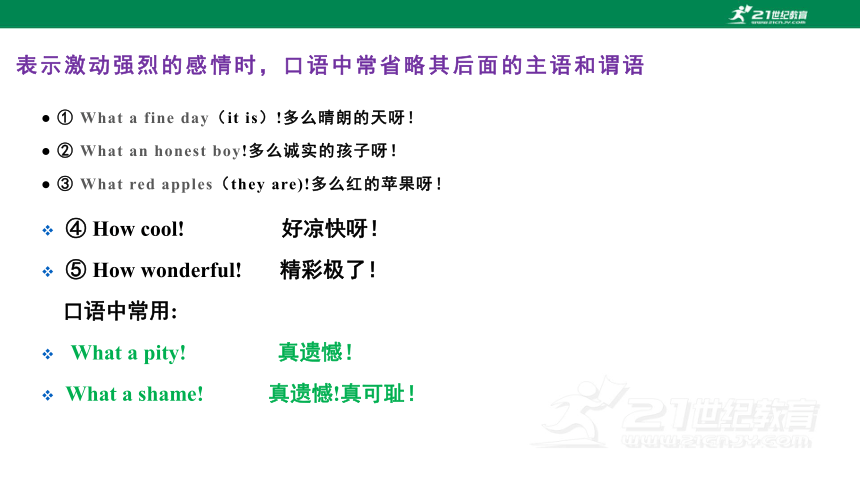
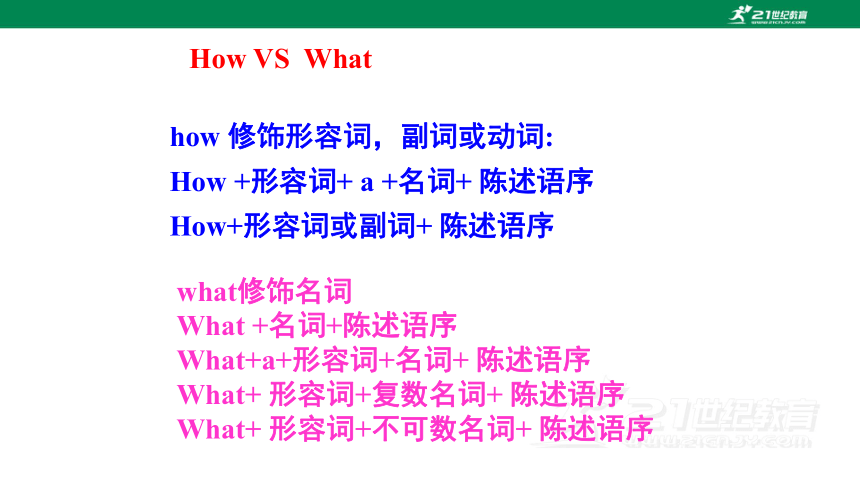
文档简介
(共44张PPT)
人教版2022-2023年度九年级英语全册同步课件
Unit 2 I think that mooncakes are delicious.
SectionA(Grammar Focus-4c)
Learning objectives
1.To learn to use the Objective Clause with “that”, “whether” and “if”.
2.To learn to use exclamatory statements.
She is a lovely girl.
Look and say
What a lovely girl she is!
Lead in
They are beautiful flowers .
What beautiful flowers they are!
It is bad weather.
What bad weather it is!
一、what引导的感叹句结构:
1 What a lovely girl she is!
2 What beautiful flowers they are!
3 What bad weather it is!
what
n.短语
主+谓
+
+
n.单数
n.不可数
n.复数
可省略
陈述语序
1. What + a/ an + adj.+可数名词单数+ (主语+谓语)!
2. What + adj.+可数名词复数+(主语+谓语)!
3. What + adj. + 不可数名词+(主语+谓语)!
Exciting people
The people are exciting.
How exciting the people are!
He runs fast!
How fast he runs!
一、How引导的感叹句结构:
1 How excited they are!
2 How fast he runs!
How
adj./adv.
主+谓
+
+
adv.副词
adj.形容词
可省略
陈述语序
1. How + adj. + 主语 + 谓语!
2. How + adv. + 主语 + 谓语!
原级
拓展:表示同一意义时,感叹既可用“what” 引导,也可用"how"引导
① What a hot day it is! How hot the day is !
多么热的天气呀!
② What tall buildings they are! How tall the buildings are!
多么高的楼房呀!
③ What bad weather it is! How bad the weather is!
多么糟糕的天气呀!
④ What bright sunshine it is! How bright the sunshine is!
多么明亮的阳光呀!
表示激动强烈的感情时,口语中常省略其后面的主语和谓语
① What a fine day(it is)!多么晴朗的天呀!
② What an honest boy!多么诚实的孩子呀!
③ What red apples(they are)!多么红的苹果呀!
④ How cool! 好凉快呀!
⑤ How wonderful! 精彩极了!
口语中常用:
What a pity! 真遗憾!
What a shame! 真遗憾!真可耻!
what修饰名词
What +名词+陈述语序
What+a+形容词+名词+ 陈述语序
What+ 形容词+复数名词+ 陈述语序
What+ 形容词+不可数名词+ 陈述语序
how 修饰形容词,副词或动词:
How +形容词+ a +名词+ 陈述语序
How+形容词或副词+ 陈述语序
How VS What
Exercise
Fill in the blanks with What, What a / an or How
1).______ difficult homework we had yesterday!
2).________cute dog it is!
3).________ interesting the story is!
4).________ bad weather in England is!
5).________ honest boy Tom is !
6).________ delicious the cakes are !
What
What a
How
What
How
What an
7).________ good time we had on the beach
yesterday!
8).________ exciting news you've brought us!
9).________cool your new car is!
10).________ scary these tigers are!
What
What
How
How
Do you know who is the first Chinese astronaut (宇航员)
Our teacher told us that the earth goes around the sun.
Please tell me where she has gone.
I don’t know if he will come tonight.
Let’s find out what’s on tonight .
Find out the Object Clauses
注:that 在句中无词汇意义,在从句中不能充当成分,在口语当中往往省略。
e.g.
1.I hear (that) he will be back in an hour.
2.He said (that) he missed us very much.
1.由从属连词that引导的宾语从句
a. 在主+谓+it(形式宾语)+宾补+that 从句(真正宾语) 的句型中不省略.
eg: We must make it clear that we mean what we say.
b. 由连词and连接的两个由that引导的宾语从句中,第二个that 不省略.
that在宾语从句中的省略与保留
eg: He told me( that) he would come and that he would come on time.
c.当that作介词except, in等宾语时
e.g. They believe in that she must still be single.
I know nothing about him except that he is
living in Beijing.
2.由从属连词 whether, if 引导的宾语从句
I want to know if/whether she is right .
They didn’t know whether Tom could come back or not .
if/whether 引导宾语从句 表示“是否”
if/whether可互换, 但whether…or not为固定搭配.
1).whether和if都可以引导宾语从句
eg: I don’t know whether or not he will come.
注意:如果or not放在whether所引导的从句
句尾,则可以用if来替换。
I don’t know whether/if he will come or not.
eg: I worry about whether I hurt her feeling.
注意whether和if的使用区别
a.当whether后紧跟or not时,不用if.
b.介词后面的宾语从句不能用if.
He asked me whether I wanted to go there by train or by bus.
他问我是想乘火车还是坐公共汽车去那里。
注:whether和or一起还有“不管”之意,引导让步状语从句。
Whether he drives or takes the train, he will be here on time.
不管开车来还是乘火车来,他都会准时到。
c.在强调任意选择时,用whether…or,此时不用 if 替换whether。
e.g. Whether he will come I am not sure.
e.g. He asked me whether I’d move to New York if I got the job.
d. 虽引导宾语从句,但为了强调宾语部分,也可把从句放在句首,此时只用whether不用if。
e. 句子中有if 引导的条件句,如再有表示
“是否”的宾语从句,用whether不用if。
Please let me know if you need help.
如果你需要帮助请告诉我。
或:请告诉我你是否需要帮助。对比:
Please let me know whether you need help.
请告诉我你是否需要帮助。
I don’t know if it won't rain tomorrow.
我不知道明天是不是会下雨。
f. 容易产生歧义时用whether不用if来表示
“是否”。
g. 如果宾语从句为否定句时,则只用if不用whether。
2).引导主语从句置于句首时,只能用whether
e.g. Whether he comes or not makes no difference.
3). Whether可以引导表语从句和同位语从句,if不可以
4).用在动词不定式之前时用whether不用if。
I don’t know whether to go there at once.
我不知道是不是该立刻去那里。
3.由连接代词 Who, whom, whose, which, what 和连接副词 where, how, why, when引导的宾语从句
e.g.
1.Do you know whose book it is
2.Please tell me when we’ll have a meeting .
3.Could you tell me why the train is late
4.He asked who could answer the question.
当主句是一般现在时,宾语从句的时态不作限制,我们可以根据句子的意思来使用需要的任何一种时态。
I hear (that)
Jim went to work an hour ago.
he is interested in English.
she will come tomorrow.
Tom has been to London twice.
2. 宾语从句中时态的变化
the sun is much bigger than the moon .
Summer is after Spring .
the earth moves around the sun.
He told me (that)
We kmew (that)
The teacher told us (that)
当宾语从句说明的是客观存在的事实或者是客观存在的真理时,就不用受到主句时态的限制,仍是用一般现在时态。
主句时态 从句时态
一般现在时、一般将来时、祈使句时 根据句意的需要用任意一种时态
一般过去时 与原句相对应的过去的时态
客观事实、真理、自然现象、名言警句、谚语等 一律用一般现在时
Danny says that he will learn English.
Do you know where he came from
Please tell me how I can get to the bus station .
无论主句是陈述句还是疑问句,宾语从句都是运用陈述句的语序,即是“主语在前,谓语在后”的顺序。
3.宾语从句的语序
宾语从句三要素
引导词
that+陈述句
if/whether+一般疑问句
特殊疑问词+特殊疑问句
时态
主句为一般现在时
主句为一般过去时
一般过去时
过去将来时
过去进行时
过去完成时
语序
宾语从句的语序都为陈述句语序
从句客观真理时态不变
从句可为任何时态
Exercise
Who can answer the question?The teacher asked.
→The teacher asked who could answer the question.
What’s wrong What’s the matter
What’s happening What happened
Eg: I don’t know what’s the matter.
用if 或whether 填空
1. I don’t know ___________ I’ll be free tomorrow.
2. I don’t know __________ or not I’ll be free tomorrow.
3. The question is __________ this book is worth writing.
whether/if
whether
whether
Read the passage below and underline the objective clauses. If possible, write your own sentences about Mother’s Day and Father’s Day using objective clauses.
4b
Dear Xia Yu,
Do you know that there are two special days for parents in America
One is Mother’s Day on the second Sunday of May, and the other is Father’s Day on the third Sunday of June. On these two days, American children often give gifts to their parents or take them out for lunch or mon gifts are flowers and cards for mothers and shirts or ties for fathers.
tie n. 领带(可数)
复数形式:ties
e.g. I bought a tie for my
father yesterday.
tie v. 系,捆 tying
e.g. She is tying her shoes.
Objective clause:
1. Do you know that there are two special days
for parents in America
2. I heard that it is becoming more and more
popular to celebrate Mother’s Day and
Father’s Day in China.
3. I wonder if children over there also give
similar gifts to their parents.
4. I believe that there are many ways to show
our love.
Actually, we don’t have to spend a lot of money. 事实上,我们不必花很多钱。
have to 意为“必须;不得不”,强调由于客
观因素主语不得不做某事,有人称和时态的变
化,其后跟动词原形。
Because he had no money, he had to drop
out of school.
因为没有钱,他不得不辍学。
Language Points
have to 与 must
have to: “必须;不得不”,表示客观需要,
有人称、数、时态的变化。
don’t have to 表示“不必”
must : “必须; 一定” 表示说话人主观上的看
法,must 只有一种形式。
mustn’t 表示“禁止”
You don’t have to tell him about it.
你不必把这件事告诉他。
You mustn't tell him about it.
你一定不要把这件事告诉他。
(2) spend 动词,意为“用,花”,常用句型为
spend some time/ money ( in ) doing sth.
花费时间/钱做某事。spend 后接动词的-ing。
I spent two hour (in) reading the novel.
我花了两小时读这篇小说。
I spent 100 yuan buying the sweater.
我花了100元买这件毛衣。
4c Which festival do you like best Ask your group and report to the class.
e.g. In our group, David’s favorite festival is ... He thinks that …
In our group, David’s favorite festival is Halloween. He thinks that on that day children will wear special costumes with mask to take part in Halloween party. And play “trick or treat”.
Sample:
1. Objective Clause with “that”, “whether”
and “if”.
2. Exclamatory statements.
Summary
Summary
1. Objective Clause with “that”, “whether”
and “if”.
2. Exclamatory statements.
Homework
1.Write sth. about your favorite festival.
2. Finish off Wb. exercises.
3. Preview the next lesson.
谢谢
21世纪教育网(www.21cnjy.com)
中小学教育资源网站
兼职招聘:
https://www.21cnjy.com/recruitment/home/admin
人教版2022-2023年度九年级英语全册同步课件
Unit 2 I think that mooncakes are delicious.
SectionA(Grammar Focus-4c)
Learning objectives
1.To learn to use the Objective Clause with “that”, “whether” and “if”.
2.To learn to use exclamatory statements.
She is a lovely girl.
Look and say
What a lovely girl she is!
Lead in
They are beautiful flowers .
What beautiful flowers they are!
It is bad weather.
What bad weather it is!
一、what引导的感叹句结构:
1 What a lovely girl she is!
2 What beautiful flowers they are!
3 What bad weather it is!
what
n.短语
主+谓
+
+
n.单数
n.不可数
n.复数
可省略
陈述语序
1. What + a/ an + adj.+可数名词单数+ (主语+谓语)!
2. What + adj.+可数名词复数+(主语+谓语)!
3. What + adj. + 不可数名词+(主语+谓语)!
Exciting people
The people are exciting.
How exciting the people are!
He runs fast!
How fast he runs!
一、How引导的感叹句结构:
1 How excited they are!
2 How fast he runs!
How
adj./adv.
主+谓
+
+
adv.副词
adj.形容词
可省略
陈述语序
1. How + adj. + 主语 + 谓语!
2. How + adv. + 主语 + 谓语!
原级
拓展:表示同一意义时,感叹既可用“what” 引导,也可用"how"引导
① What a hot day it is! How hot the day is !
多么热的天气呀!
② What tall buildings they are! How tall the buildings are!
多么高的楼房呀!
③ What bad weather it is! How bad the weather is!
多么糟糕的天气呀!
④ What bright sunshine it is! How bright the sunshine is!
多么明亮的阳光呀!
表示激动强烈的感情时,口语中常省略其后面的主语和谓语
① What a fine day(it is)!多么晴朗的天呀!
② What an honest boy!多么诚实的孩子呀!
③ What red apples(they are)!多么红的苹果呀!
④ How cool! 好凉快呀!
⑤ How wonderful! 精彩极了!
口语中常用:
What a pity! 真遗憾!
What a shame! 真遗憾!真可耻!
what修饰名词
What +名词+陈述语序
What+a+形容词+名词+ 陈述语序
What+ 形容词+复数名词+ 陈述语序
What+ 形容词+不可数名词+ 陈述语序
how 修饰形容词,副词或动词:
How +形容词+ a +名词+ 陈述语序
How+形容词或副词+ 陈述语序
How VS What
Exercise
Fill in the blanks with What, What a / an or How
1).______ difficult homework we had yesterday!
2).________cute dog it is!
3).________ interesting the story is!
4).________ bad weather in England is!
5).________ honest boy Tom is !
6).________ delicious the cakes are !
What
What a
How
What
How
What an
7).________ good time we had on the beach
yesterday!
8).________ exciting news you've brought us!
9).________cool your new car is!
10).________ scary these tigers are!
What
What
How
How
Do you know who is the first Chinese astronaut (宇航员)
Our teacher told us that the earth goes around the sun.
Please tell me where she has gone.
I don’t know if he will come tonight.
Let’s find out what’s on tonight .
Find out the Object Clauses
注:that 在句中无词汇意义,在从句中不能充当成分,在口语当中往往省略。
e.g.
1.I hear (that) he will be back in an hour.
2.He said (that) he missed us very much.
1.由从属连词that引导的宾语从句
a. 在主+谓+it(形式宾语)+宾补+that 从句(真正宾语) 的句型中不省略.
eg: We must make it clear that we mean what we say.
b. 由连词and连接的两个由that引导的宾语从句中,第二个that 不省略.
that在宾语从句中的省略与保留
eg: He told me( that) he would come and that he would come on time.
c.当that作介词except, in等宾语时
e.g. They believe in that she must still be single.
I know nothing about him except that he is
living in Beijing.
2.由从属连词 whether, if 引导的宾语从句
I want to know if/whether she is right .
They didn’t know whether Tom could come back or not .
if/whether 引导宾语从句 表示“是否”
if/whether可互换, 但whether…or not为固定搭配.
1).whether和if都可以引导宾语从句
eg: I don’t know whether or not he will come.
注意:如果or not放在whether所引导的从句
句尾,则可以用if来替换。
I don’t know whether/if he will come or not.
eg: I worry about whether I hurt her feeling.
注意whether和if的使用区别
a.当whether后紧跟or not时,不用if.
b.介词后面的宾语从句不能用if.
He asked me whether I wanted to go there by train or by bus.
他问我是想乘火车还是坐公共汽车去那里。
注:whether和or一起还有“不管”之意,引导让步状语从句。
Whether he drives or takes the train, he will be here on time.
不管开车来还是乘火车来,他都会准时到。
c.在强调任意选择时,用whether…or,此时不用 if 替换whether。
e.g. Whether he will come I am not sure.
e.g. He asked me whether I’d move to New York if I got the job.
d. 虽引导宾语从句,但为了强调宾语部分,也可把从句放在句首,此时只用whether不用if。
e. 句子中有if 引导的条件句,如再有表示
“是否”的宾语从句,用whether不用if。
Please let me know if you need help.
如果你需要帮助请告诉我。
或:请告诉我你是否需要帮助。对比:
Please let me know whether you need help.
请告诉我你是否需要帮助。
I don’t know if it won't rain tomorrow.
我不知道明天是不是会下雨。
f. 容易产生歧义时用whether不用if来表示
“是否”。
g. 如果宾语从句为否定句时,则只用if不用whether。
2).引导主语从句置于句首时,只能用whether
e.g. Whether he comes or not makes no difference.
3). Whether可以引导表语从句和同位语从句,if不可以
4).用在动词不定式之前时用whether不用if。
I don’t know whether to go there at once.
我不知道是不是该立刻去那里。
3.由连接代词 Who, whom, whose, which, what 和连接副词 where, how, why, when引导的宾语从句
e.g.
1.Do you know whose book it is
2.Please tell me when we’ll have a meeting .
3.Could you tell me why the train is late
4.He asked who could answer the question.
当主句是一般现在时,宾语从句的时态不作限制,我们可以根据句子的意思来使用需要的任何一种时态。
I hear (that)
Jim went to work an hour ago.
he is interested in English.
she will come tomorrow.
Tom has been to London twice.
2. 宾语从句中时态的变化
the sun is much bigger than the moon .
Summer is after Spring .
the earth moves around the sun.
He told me (that)
We kmew (that)
The teacher told us (that)
当宾语从句说明的是客观存在的事实或者是客观存在的真理时,就不用受到主句时态的限制,仍是用一般现在时态。
主句时态 从句时态
一般现在时、一般将来时、祈使句时 根据句意的需要用任意一种时态
一般过去时 与原句相对应的过去的时态
客观事实、真理、自然现象、名言警句、谚语等 一律用一般现在时
Danny says that he will learn English.
Do you know where he came from
Please tell me how I can get to the bus station .
无论主句是陈述句还是疑问句,宾语从句都是运用陈述句的语序,即是“主语在前,谓语在后”的顺序。
3.宾语从句的语序
宾语从句三要素
引导词
that+陈述句
if/whether+一般疑问句
特殊疑问词+特殊疑问句
时态
主句为一般现在时
主句为一般过去时
一般过去时
过去将来时
过去进行时
过去完成时
语序
宾语从句的语序都为陈述句语序
从句客观真理时态不变
从句可为任何时态
Exercise
Who can answer the question?The teacher asked.
→The teacher asked who could answer the question.
What’s wrong What’s the matter
What’s happening What happened
Eg: I don’t know what’s the matter.
用if 或whether 填空
1. I don’t know ___________ I’ll be free tomorrow.
2. I don’t know __________ or not I’ll be free tomorrow.
3. The question is __________ this book is worth writing.
whether/if
whether
whether
Read the passage below and underline the objective clauses. If possible, write your own sentences about Mother’s Day and Father’s Day using objective clauses.
4b
Dear Xia Yu,
Do you know that there are two special days for parents in America
One is Mother’s Day on the second Sunday of May, and the other is Father’s Day on the third Sunday of June. On these two days, American children often give gifts to their parents or take them out for lunch or mon gifts are flowers and cards for mothers and shirts or ties for fathers.
tie n. 领带(可数)
复数形式:ties
e.g. I bought a tie for my
father yesterday.
tie v. 系,捆 tying
e.g. She is tying her shoes.
Objective clause:
1. Do you know that there are two special days
for parents in America
2. I heard that it is becoming more and more
popular to celebrate Mother’s Day and
Father’s Day in China.
3. I wonder if children over there also give
similar gifts to their parents.
4. I believe that there are many ways to show
our love.
Actually, we don’t have to spend a lot of money. 事实上,我们不必花很多钱。
have to 意为“必须;不得不”,强调由于客
观因素主语不得不做某事,有人称和时态的变
化,其后跟动词原形。
Because he had no money, he had to drop
out of school.
因为没有钱,他不得不辍学。
Language Points
have to 与 must
have to: “必须;不得不”,表示客观需要,
有人称、数、时态的变化。
don’t have to 表示“不必”
must : “必须; 一定” 表示说话人主观上的看
法,must 只有一种形式。
mustn’t 表示“禁止”
You don’t have to tell him about it.
你不必把这件事告诉他。
You mustn't tell him about it.
你一定不要把这件事告诉他。
(2) spend 动词,意为“用,花”,常用句型为
spend some time/ money ( in ) doing sth.
花费时间/钱做某事。spend 后接动词的-ing。
I spent two hour (in) reading the novel.
我花了两小时读这篇小说。
I spent 100 yuan buying the sweater.
我花了100元买这件毛衣。
4c Which festival do you like best Ask your group and report to the class.
e.g. In our group, David’s favorite festival is ... He thinks that …
In our group, David’s favorite festival is Halloween. He thinks that on that day children will wear special costumes with mask to take part in Halloween party. And play “trick or treat”.
Sample:
1. Objective Clause with “that”, “whether”
and “if”.
2. Exclamatory statements.
Summary
Summary
1. Objective Clause with “that”, “whether”
and “if”.
2. Exclamatory statements.
Homework
1.Write sth. about your favorite festival.
2. Finish off Wb. exercises.
3. Preview the next lesson.
谢谢
21世纪教育网(www.21cnjy.com)
中小学教育资源网站
兼职招聘:
https://www.21cnjy.com/recruitment/home/admin
同课章节目录
- Unit 1 How can we become good learners.
- Section A
- Section B
- Unit 2 I think that mooncakes are delicious!
- Section A
- Section B
- Unit 3 Could you please tell me where the restroom
- Section A
- Section B
- Unit 4 I used to be afraid of the dark.
- Section A
- Section B
- Unit 5 What are the shirts made of?
- Section A
- Section B
- Review of Units 1-5
- Unit 6 When was it invented?
- Section A
- Section B
- Unit 7 Teenagers should be allowed to choose their
- Section A
- Section B
- Unit 8 It must belong to Carla.
- Section A
- Section B
- Unit 9 I like music that I can dance to.
- Section A
- Section B
- Unit 10 You're supposed to shake hands.
- Section A
- Section B
- Review of Units 6-10
- Unit 11 Sad movies make me cry.
- Section A
- Section B
- Unit 12 Life is full of the unexpected
- Section A
- Section B
- Unit 13 We're trying to save the earth!
- Section A
- Section B
- Unit 14 I remember meeting all of you in Grade 7.
- Section A
- Section B
- Review of Units 11-14
